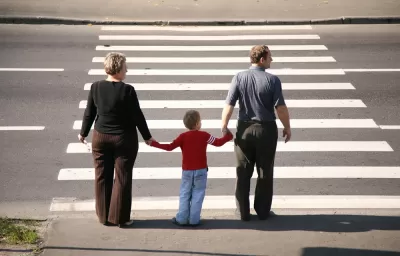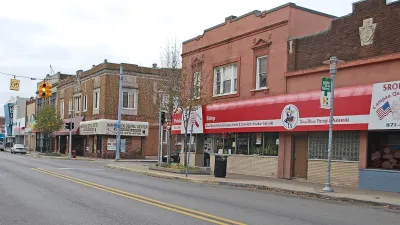Researchers continue to verify the health benefits of walkable neighborhoods. Most recently researchers at Kansas University found benefits that communities can use to ensure the quality of life of aging residents.

"New study results from the University of Kansas to be presented this weekend at the Gerontological Society of America’s annual meeting in Washington, D.C., bolster the adage that 'heart healthy is brain healthy,'" according to a press release from the University of Kansas.
Here is the key point about the finding: "The investigation shows neighborhoods that motivate walking can stave off cognitive decline in older adults."
Here's how the press release describes the study's methodology: "The KU researcher [Amber Watts] and her colleagues used the space syntax data to estimate a 'walkability score' for subjects' home addresses. Then they estimated the relationship between people's neighborhood scores and their performance on cognitive tests over two years, factoring in issues like age, gender, education and wealth, that might influence people’s cognitive scores independently of neighborhood characteristics."
FULL STORY: Research shows easy-to-walk communities can blunt cognitive decline

Alabama: Trump Terminates Settlements for Black Communities Harmed By Raw Sewage
Trump deemed the landmark civil rights agreement “illegal DEI and environmental justice policy.”

Study: Maui’s Plan to Convert Vacation Rentals to Long-Term Housing Could Cause Nearly $1 Billion Economic Loss
The plan would reduce visitor accommodation by 25% resulting in 1,900 jobs lost.

Why Should We Subsidize Public Transportation?
Many public transit agencies face financial stress due to rising costs, declining fare revenue, and declining subsidies. Transit advocates must provide a strong business case for increasing public transit funding.

Wind Energy on the Rise Despite Federal Policy Reversal
The Trump administration is revoking federal support for renewable energy, but demand for new projects continues unabated.

Passengers Flock to Caltrain After Electrification
The new electric trains are running faster and more reliably, leading to strong ridership growth on the Bay Area rail system.

Texas Churches Rally Behind ‘Yes in God’s Back Yard’ Legislation
Religious leaders want the state to reduce zoning regulations to streamline leasing church-owned land to housing developers.
Urban Design for Planners 1: Software Tools
This six-course series explores essential urban design concepts using open source software and equips planners with the tools they need to participate fully in the urban design process.
Planning for Universal Design
Learn the tools for implementing Universal Design in planning regulations.
Caltrans
Smith Gee Studio
Institute for Housing and Urban Development Studies (IHS)
City of Grandview
Harvard GSD Executive Education
Toledo-Lucas County Plan Commissions
Salt Lake City
NYU Wagner Graduate School of Public Service





























